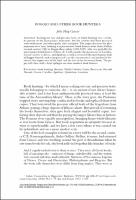Chapter Poggio and Other Book Hunters
| dc.contributor.author | Haig Gaisser, Julia | |
| dc.date.accessioned | 2022-06-01T12:17:00Z | |
| dc.date.available | 2022-06-01T12:17:00Z | |
| dc.date.issued | 2020 | |
| dc.identifier | ONIX_20220601_9788864539683_418 | |
| dc.identifier.issn | 2704-6230 | |
| dc.identifier.uri | https://library.oapen.org/handle/20.500.12657/56235 | |
| dc.description.abstract | Seeking out rare and precious texts, or book hunting, was a favorite pursuit of the Renaissance humanists, but the activity had been practiced with enthusiasm (and often guile) since antiquity. This paper discusses the phenomenon over time, looking at representative book hunters from Aulus Gellius (second century CE) to Poggio Bracciolini (1380-1459), who was probably the most famous book hunter of them all. I will consider the discoveries of Catullus, Cicero’s Letters to Atticus, and Apuleius as well as several of the most famous finds of Poggio himself, emhasizing in each case the circumstances and method of discovery, the importance of the find, and the fate of the discovered book. The paper will close with a brief epilogue on some modern book hunters. | |
| dc.language | English | |
| dc.relation.ispartofseries | Atti | |
| dc.subject.other | book hunting | |
| dc.subject.other | libraries | |
| dc.subject.other | Phyllis Gordan | |
| dc.subject.other | Dante | |
| dc.subject.other | Boccaccio | |
| dc.subject.other | Niccoló Niccoli | |
| dc.subject.other | Cicero | |
| dc.subject.other | Catullus | |
| dc.subject.other | Apuleius | |
| dc.subject.other | Quintilian | |
| dc.subject.other | Lucretius | |
| dc.title | Chapter Poggio and Other Book Hunters | |
| dc.type | chapter | |
| oapen.identifier.doi | 10.36253/978-88-6453-968-3.13 | |
| oapen.relation.isPublishedBy | bf65d21a-78e5-4ba2-983a-dbfa90962870 | |
| oapen.relation.isbn | 9788864539683 | |
| oapen.series.number | 38 | |
| oapen.pages | 16 | |
| oapen.place.publication | Florence |

